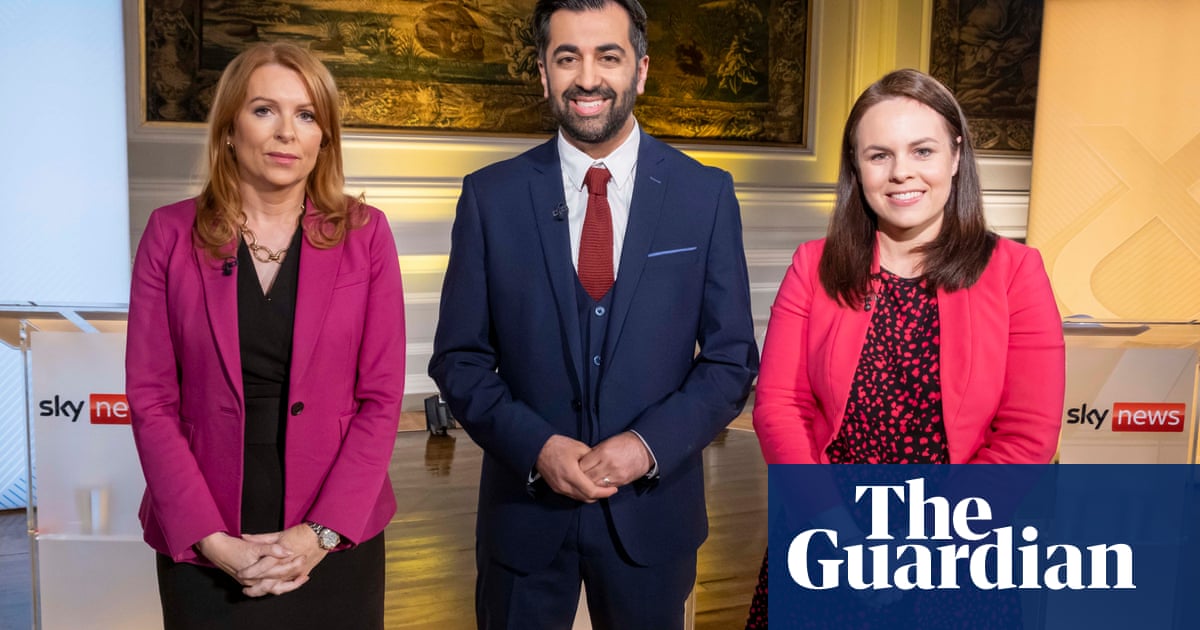
Deep splits over LGBT+ rights have emerged between the two leading candidates vying to replace Nicola Sturgeon as first minister of Scotland.
The finance minister, Kate Forbes – who returned early from maternity leave on Monday to declare her bid for leadership of the SNP – told reporters in a round of interviews that she would not challenge the UK government’s block on Holyrood’s gender recognition reform bill, did not support self-identification for trans people and would not have voted for same-sex marriage.
On the first full day of campaigning in the six-week contest prompted by Sturgeon’s unexpected resignation last week, Forbes’ pronouncements stood in direct contrast to those of the health secretary, Humza Yousaf, who emerged as frontrunner and picked up a fist of endorsements from senior party figures after initial bookmakers’ favourite, the culture secretary, Angus Robertson, ruled himself out of the race.
Yousaf told a press conference earlier in the day that he backed Sturgeon’s positions on same-sex marriage, abortion clinic buffer zones, banning conversion practices and on gender recognition, confirming he would “absolutely” challenge Westminster’s use of a section 35 to prevent the bill – which was supported cross-party in Holyrood – going for royal assent.
But Forbes, a member of the socially conservative, evangelical Free Church of Scotland, told the Guardian that while it is “outrageous” that UK government should seek to overturn Holyrood legislation, she would not challenge the section 35 in the court because she doesn’t “believe that is in line with the public’s priorities”.
Forbes insisted this was “not the end” of the reforms, saying that she wanted to engage with the UK government on the amendments that need to be made to make it compatible with UK-wide legislation, but would not specify whether this could include dropping the process of self-identification, by which an individual can change their legal sex after living in their acquired gender for three months and signing a statutory declaration.
She said that she would have found it “very difficult” to support the bill at Holyrood had she not been on leave, and that she does not support self-identification without wider safeguards, adding that the recent rows over the placement of transgender prisoners in women’s prisons highlighted the need for “further reassurance about safe spaces”.
This echoes criticisms made by the third leadership candidate, Ash Regan – a former minister who quit Sturgeon’s government in protest at the gender bill, but is widely regarded as an outlier in the contest.
This comes after the Guardian reported warnings from senior SNP figures that the contest must not be dominated by ongoing rows on gender recognition reform, which campaign groups say has resulted in a climate of escalating hostility towards trans people in Scotland. Meanwhile, Scottish Greens sources have suggested that any rowback on reform could lead to the collapse of the party’s power-sharing agreement with the SNP.
Asked how her election would impact on the agreement, Forbes said this was “really a question for them” adding that, given her emphasis on economic prosperity, there could be “other areas that they would be keen to discuss in advance of making any confirmed position”.
Later on Monday, after widespread coverage of Forbes’ remarks, the Scottish Greens released a statement warning that not challenging the section 35 would be a “damaging precedent” and reaffirming their commitment to the bill.
The Guardian asked Forbes how she planned to pitch herself as a “leader who inspires confidence” to LGBT+ members of the party and the country, given her beliefs.
Forbes said: “In a pluralistic, tolerant society, I will defend to the hilt everybody’s rights to live and to love free of harassment and fear. I would hope that I might be afforded the same freedom and the same right to believe and practice fairly mainstream views that are actually common across the mainstream religions, in terms of Islam and so on.”
Yousaf, a practising Muslim, said that he stood on the SNP’s progressive manifesto. “People can look at my track record, but I don’t legislate on the basis of my faith. I do what I think is the best for the country.”
Aside from social issues, there was also division between the leading candidates on independence strategy. Forbes did not immediately dismiss Sturgeon’s plan to run the coming general election as a de facto referendum, following the supreme court’s ruling that Holyrood did not have the powers to hold a second independence poll without Westminster’s agreement. She said she saw it “as a means of maximising the pressure on the UK government, rather than it being necessarily a referendum in and of itself”.
Earlier, Yousaf said he disagreed with Sturgeon’s decision to make the next Westminster general election a “de facto referendum” on independence.
Forbes said her strengths included the ability to reach out both to the wider Yes movement – “there’s a perception that decisions have been made by too few people in the SNP,” she said – and beyond SNP voters, with her focus on delivery and the economy.












